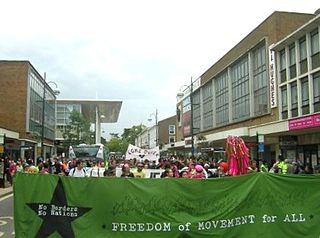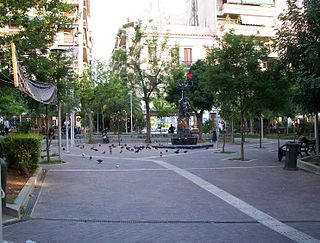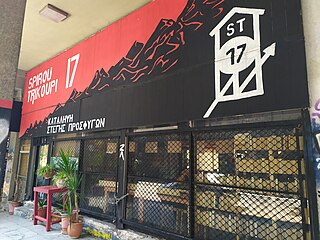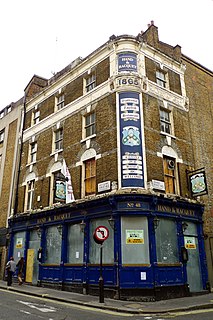Related Research Articles

Squatting is the action of occupying an abandoned or unoccupied area of land or a building, usually residential, that the squatter does not own, rent or otherwise have lawful permission to use. The United Nations estimated in 2003 that there were one billion slum residents and squatters globally. Squatting occurs worldwide and tends to occur when people who are poor and homeless find empty buildings or land to occupy for housing. It has a long history, broken down by country below.
The WOMBLES were a loosely aligned anarchist and anti-capitalist group based in London. They gained prominence in the early 2000s for wearing white overalls with padding and helmets at May Day protests, mimicking the Italian group Tute Bianche.

The No Border Network refers to loose associations of autonomous organisations, groups, and individuals in Western Europe, Central Europe, Eastern Europe and beyond. They support freedom of movement and resist human migration control by coordinating international border camps, demonstrations, direct actions, and anti-deportation campaigns.

SchNEWS was a free weekly publication from Brighton, England, which ran from November 1994 until September 2014. The main focus was environmental and social issues/struggles in the UK – but also internationally – with an emphasis on direct action protest, and autonomous political struggles outside formalised political parties.

Villa Amalia is the name of the building that hosted the former Second High School of Athens in Greece. It is located on the corner of Acharnon and Heiden streets, near Victoria metro station. It was an anarchist squat before its eviction in 2012. It reopened as a school in 2016.

Self-managed social centres in the United Kingdom can be found in squatted, rented, mortgaged and fully owned buildings. These self-managed social centres differ from community centres in that they are self-organised under anti-authoritarian principles and volunteer-run, without any assistance from the state. The largest number have occurred in London from the 1980s onwards, although projects exist in most cities across the UK, linked in a network. Squatted social centres tend to be quickly evicted and therefore some projects deliberately choose a short-term existence, such as A-Spire in Leeds or the Okasional Café in Manchester. Longer term social centres include the 1 in 12 Club in Bradford, the Cowley Club in Brighton and the Sumac Centre in Nottingham, which are co-operatively owned.

Exarcheia is a self-governing neighbourhood in central Athens, Greece close to the historical building of the National Technical University of Athens. The district took its name from a 19th century businessman named Exarchos who opened a large general store there. Exarcheia is bordered on the east by Kolonaki and is framed by Patission Street, Panepistimiou Street and Alexandras Avenue. Exarcheia is renowned for being Athens' historical core of radical political and intellectual activism. Exarcheia is often considered the anarchist quarter of Athens, known for its radical democracy.

Patio Maravillas was a multi-purpose self-managed social centre which occupied several spaces in central Madrid between 2007 and 2015.

Self-managed social centres in Italy exist in many cities. They are part of different left-wing political networks including anarchist, communist, socialist, and autonomist. The centres tend to be squatted and provide self-organised, self-financing spaces for alternative and noncommercial activities such as concerts, exhibitions, farmers' markets, infoshops, and migrant initiatives. Over time, some but not all projects have opted to legalize their status.
The Spike Surplus Scheme was a community-run self-managed social centre in a squatted building in Peckham, South London. It was occupied in 1999 and provided a range of mostly free activities for local people until its eviction in 2009 by Southwark Council.

Squatting in England and Wales usually refers to a person who is not the owner, taking possession of land or an empty house. People squat for a variety of reasons which include needing a home, protest, poverty, and recreation. Many squats are residential, some are also opened as social centres. Land may be occupied by New Age travellers or treesitters.

Bloomsbury Social Centre was the name given to a building in Bloomsbury, London, which was squatted as a self-managed social centre by students in affiliation with Occupy London, and the global Occupy movement. It was occupied on Wednesday, 23 November 2011, and evicted on Thursday, 22 December, lasting a total of 30 days. It was situated at 53 Gordon Square, in an historic six-storey Georgian Grade II-listed building, renovated by famous British architect, Charles Holden, the principal architect of nearby Senate House.

Athens refugee squats exist since the 2015 spike in the European migrant crisis, Greece has been a destination for migrants seeking refuge on the European continent via the "Balkan Route." Coalitions of solidarity groups and migrants have established squats throughout Athens to house refugees, demonstrating an alternative to solutions offered by the European Union and NGOs. The squats are grouped together in the Coordination of Refugee Squats. Notable projects included 5th School and City Plaza. In late 2019, the New Democracy party declared it would evict all the squats.

Klinika was a squatted self-managed social centre in Žižkov, Prague, from 2014 until 2019. It followed in the tradition of anarchist projects such as Ladronka and Milada.

The Really Free School was a collective squatting a series of buildings in central London in 2011. They organised lectures and workshops, stating "in this space, aside from the fact that you will not spend one penny inside these doors, you can also come and engage in a collective learning process directed by your own desires, ideas, questions and problems."

Squatting in Australia usually refers to a person who is not the owner, taking possession of land or an empty house. In 19th century Australian history, a squatter was a settler who occupied a large tract of Aboriginal land in order to graze livestock. At first this was done illegally, later under licence from the Crown.

Squatting in the Republic of Ireland is the occupation of unused land or derelict buildings without the permission of the owner. In the 1960s, the Dublin Housing Action Committee highlighted the housing crisis by squatting buildings. From the 1990s onwards there have been occasional political squats such as Grangegorman.

Centro Sociale Leoncavallo is a self-managed social centre in Milan, Italy, which exists since a former factory on via Leoncavallo was squatted in 1975. It was evicted and partially demolished in 1989, then quickly reoccupied and rebuilt. It was evicted again in 1994 and briefly moved to a warehouse for six months before occupying its still extant location on via Antoine Watteau. Activities include concerts, theatre, debates, exhibitions and a radio station. The centre describes itself as Leoncavallo Self-Managed Public Space.

Squatting became a political phenomenon in the Czech Republic after the Velvet Revolution in 1989. Squats in Prague included Sochora, Stary Střešovice and Ladronka. Milada was occupied in 1998 and following its final eviction in 2009, there was a lull in squatting actions. In the 2010s a new social movement squatted houses to highlight the number of derelict properties in Prague and the social centre Klinika was founded in 2014.
Squatting is the occupation of unused or derelict buildings or land without the permission of the owner. From the 17th century onwards, there have been waves of squatting in Ukraine. In the 21st century, squatting has been practiced by different groups such as artists, anarchists, Ukrainian nationalists, displaced Crimean Tatars returning to the region and refugees created by the annexation of Crimea by the Russian Federation.
References
- 1 2 3 "Social centre squatters finally evicted after five year battle". East London advertiser. 19 October 2009. Archived from the original on 2 May 2019. Retrieved 2 May 2019.
- ↑ Topping, Alexandra; Sturcke, James; Weaver, Matthew (2 April 2009). "G20 summit and protests: live blog". Guardian. Archived from the original on 28 April 2019. Retrieved 2 May 2019.
- ↑ Rampart Eviction – The Priest and the Chainsaw | rampART Archived 12 November 2012 at the Wayback Machine
- ↑ Conlin, P (2014). "Neoliberalism out of joint: Activists and inactivists in London's social centres". Subjectivity. 7 (3): 270–287. doi:10.1057/sub.2014.8. S2CID 144906777.
- ↑ "Week of Solidarity". The New Agenda. Archived from the original on 3 August 2017. Retrieved 2 May 2019.
- ↑ Papadimitriou, Tasos; Saunders, Clare; Rootes, Christopher (2007). "Democracy and the London European Social Forum" (PDF). ECPR. Archived (PDF) from the original on 2 May 2019. Retrieved 2 May 2019.
- ↑ "Calais Photo Exhibition at G20 Infocafe, Rampart Social Centre". London No Borders. Archived from the original on 31 July 2016. Retrieved 2 May 2019.
- ↑ Finchett-Maddock, Lucy (2008). "An Anarchist's Wetherspoons 1 or Virtuous Resistance? Social Centres as MacIntyre's Vision of Practice-based Communities". Philosophy of Management. 7 (1): 21–31. doi:10.5840/pom2008714. S2CID 144807059.
- ↑ "SchNEWS in brief". SchNEWS. 18 February 2005. Archived from the original on 2 May 2019. Retrieved 2 May 2019.
